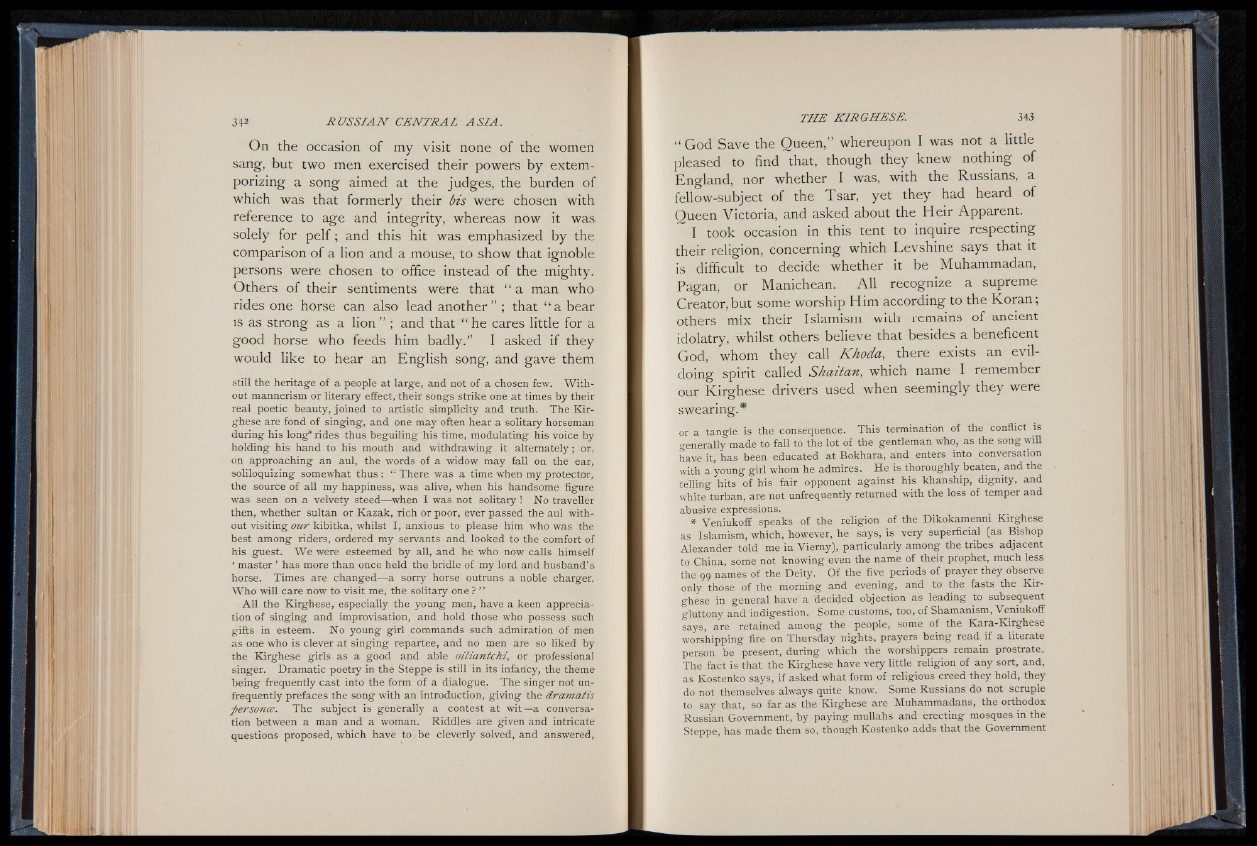
On the occasion of my visit none of the women
sang, but two men exercised their powers by extemporizing
a song aimed at the judges, the burden of
which was that formerly their bis were chosen with
reference to age and integrity, whereas now it was
solely for pelf ; and this hit was emphasized by the
comparison of a lion and a mouse, to show that ignoble
persons were chosen to office instead of the mighty.
Others of their sentiments were that “ a man who
rides one horse can also lead another” ; that “ a bear
is as strong as a lion ” ; and that “ he cares little for a
good horse who feeds him badly.” I asked if they
would like to hear an English song, and gave them
still the heritage of a people at large, and not of a chosen few. Without
mannerism or literary effect, their songs strike one at times by their
real poetic beauty, joined to artistic simplicity and truth. The Kir-
ghese are fond of singing, and one may often hear a solitary horseman
during his long* rides thus beguiling his time, modulating his voice by
holding his hand to his mouth and withdrawing it alternately ; or.
on approaching an aul, the words of a widow may fall on the ear,
soliloquizing somewhat thus : “ There was a time when my protector,
the source of all my happiness, was alive, when his handsome figure
was seen on a velvety steed— when I was not solitary ! No traveller
then, whether sultan or Kazak, rich or poor, ever passed the aul without
visiting our kibitka, whilst I, anxious to please him who was the
best among riders, ordered my servants and looked to the comfort of
his guest. W e were esteemed by all, and he who now calls himself
‘ master ’ has more than once held the bridle of my lord and husband’ s
horse. Times are changed— a sorry horse outruns a noble charger.
Who will care now to visit me, the solitary one ? ”
A ll the Kirghese, especially the young men, have a keen appreciation
of singing and improvisation, and hold those who possess such
gifts in esteem. No young girl commands such admiration of men
as one who is clever at singing repartee, and no men are so liked by
the Kirghese girls as a good and able oiliantchi, or professional
singer. Dramatic poetry in thè Steppe is still in its infarfcy, the theme
being frequently cast into the form of a dialogue. The singer not un-
frequently prefaces the song with an introduction, giving the dramatis
j>ersome. The subject is generally a contest at w it—a conversation
between a man and a woman. Riddles are given and intricate
questions proposed, which have to be cleverly solved, and answered,
“ God Save the Queen,” whereupon I was not a little
pleased to find that, though they knew nothing of
England, nor whether I was, with the Russians, a
fellow-subject of the Tsar, yet they had heard of
Queen Victoria, and asked about the Heir Apparent.
I took occasion in this tent to inquire respecting
their religion, concerning which Levshine says that it
is difficult to decide whether it be Muhammadan,
Pagan, or Manichean. All recognize a supreme
Creator,but some worship Him according to the Koran;
others mix their Islamism with remains of ancient
idolatry, whilst others believe that besides a beneficent
God, whom they call Khoda, there exists an evil-
doing spirit called Shaitan, which name I remember
our Kirghese drivers used when seemingly they were
swearing.*
or a tangle is the consequence. This termination of the conflict is
generally made to fall to the lot of the gentleman who, as the song will
have it, has been educated at Bokhara, and enters into conversation
with a young girl whom he admires. He is thoroughly beaten, and the
telling hits of his fair opponent against his khanship, dignity, and
white turban, are not unfrequently returned with the loss of temper and
abusive expressions.
* Veniukoff speaks of the religion of the Dikokamenni Kirghese
as Islamism, which, however, he says, is very superficial (as Bishop
Alexander told me in Viemy), particularly among the tribes adjacent
to China, some not knowing even the name of their prophet, much less
the 99 names of the Deity. Of the five periods of prayer they observe
only those of the morning and evening, and to the fasts the Kirghese
in general have a decided objection as leading to subsequent
gluttony and indigestion. Some customs, too, of Shamanism, Veniukoff
says, are retained among the people, some of the Kara-Kirghese
worshipping fire on Thursday nights, prayers being read if a literate
person be present, during which the worshippers remain prostrate.
The fact is that the Kirghese have very little religion of any sort, and,
as Kostenko says, if asked what form of religious creed they hold, they
do not themselves always quite know. Some Russians do not scruple
to say that, so far as the Kirghese are Muhammadans, the orthodox
Russian Government, by paying mullahs and erecting mosques in the
Steppe, has made them so, though Kostenko adds that the Government